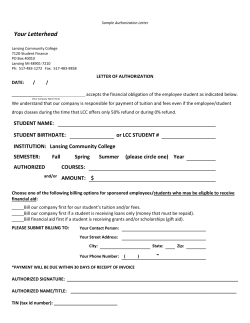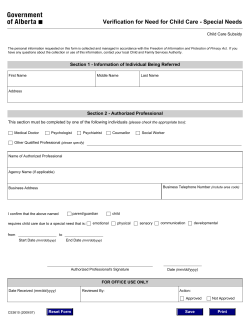
Data Classification and Protection Standard
Data Classification and Protection Standard Version Control v1.0 - Initial Documentation - 04/13/2014 v2.0 - T. Meagher, T. Pham modifications (version control, general edits) - 05/12/2015 v3.0 - - T. Meagher, T. Pham modifications (general edits) - 05/14/2015 1.0 Overview Data assets are some of the most valuable information owned by the Quincy College (QC). QC produces, collects, and uses many different types of data in fulfilling its mission. Laws and institutional policy mandate privacy and protection of certain types of data, and the Institution’s need to manage the risks to its reputation and to its constituents require the protection of other information. Classifying data is the first step in determining the data’s need for protection. 2.0 Objective / Purpose This standard is intended to help the QC community classify data for the purposes of determining its need for protection and determining applicable policies and laws. The purpose is also to minimize risk associated with the misuse of Institutional Data (whether classified as Sensitive or Restricted) at Quincy College (QC). 3.0 Scope This standard is to be used to classify any data that are stored, retained, maintained, processed, or transmitted by QC. The standard applies to all types of data including electronic data, data recorded on paper and Information shared orally, visually or by other means. 4.0 Standard 4.1 Classification Data can be classified either in terms of its need for protection (e.g. Sensitive Data) or its need for availability (e.g. Critical Data). To classify data in terms of its need for protection, use section 4.1.1 of this standard. To classify data in terms or its availability needs, use section 4.1.2 of this standard. 4.1.1 Classifying Data According to Protection Needs Match any data that requires to be classified to the one of the four categories which best describes its need for confidentiality and its risk profile. The four categories are Public, Internal, Sensitive, and Restricted. 4.1.1.1 Public Data - Data can be disclosed without restriction. Examples of data within this category are Directories, Maps, Syllabi and Course Materials, Instructions-for-Use of equipment, Instructions-for-Use of computer programs, de-identified data sets, etc. 4.1.1.2 Internal Data - Confidentiality of data is preferred, but information contained in data may be subject to open records disclosure. Examples of data within this category are email correspondences, budget plans, computer infrastructure diagrams, etc. 4.1.1.3 Sensitive Data - Data confidentiality required by law, policy, or contractual obligation. Characteristics of Sensitive Data • Compliance Risk: Protection of data is mandated by law (e.g. FERPA) or required by private contract (e.g. non-disclosure agreements). • Reputation Risk: Loss of confidentiality or integrity will cause significant damage to QC's reputation. For example, loss of social security numbers or defacement of the QC website would likely be a news item that would appear in the media. • Other Risks: Loss of confidentiality that could cause harm to individuals such as QC students, personnel, donors, and partners. The loss of confidentiality or integrity would cause QC to incur significant costs in response and remediation. • Treatment in Open Records Requests: Sensitive information will be typically redacted from open records disclosures. Examples of Sensitive Data • • • • Student records and prospective student records (w/o Social Security Numbers) Donor and alumni records Critical infrastructure information (physical plant detail, IT systems information, system passwords, information security plans, etc.) Research information related to sponsorship, funding, human subject, etc. • • • Number) Information protected by non-disclosure agreements (NDAs) or similar private contracts Law enforcement and investigative records Quincy College Identification Number (also known as the QC ID 81X 4.1.1.4 Restricted Data - Restricted data requires utmost privacy and security protections. Special authorization may be required for use and collection. Examples of this are data sets with individual Social Security Numbers (or last four of SSN), credit card transaction data or cardholder information, patient health data, financial data, etc. Characteristics of Restricted Data Vice President (VP) Approval: QC VPs or their designees/stewards must authorize all storing, processing, and transmitting of Restricted Information. • Compliance Risk: Protection of information is mandated by law (FERPA, HIPAA, GLBA) or required by private contract (PCI DSS). • Reputation Risk: Loss of confidentiality or integrity will cause significant damage to QC's reputation. • Other Risks: Loss of the confidentiality or integrity of the information that could cause harm to individuals and cause the College to incur significant costs in response. • Treatment in Open Records Requests: Records with restricted information are typically not open for public inspection. Examples of Restricted Data • • • • Social Security Numbers (or last four numbers of an individual’s SSN) Credit/debit card data Healthcare data Financial account data 4.1.2 Classifying Data According to Availability Needs Match any data that requires to be classified according to availability needs to the one of the three categories which best describes its need for availability needs. The three categories are Supportive, High-Priority, and Critical. 4.1.2.1 Supportive Data - Supportive data is necessary for day-to-day (daily) operations, but is not critical to the institute or to a Department/Unit/College's mission or core functions. Examples within this type of category are course materials, meeting minutes, workstation images, etc. 4.1.2.2 High-priority Data - Availability of data is necessary for departmental function. Destruction or temporary loss of data may have an adverse effect on college or departmental mission, but would not affect university-wide function. Examples within this category are campus service architectural diagrams, marketing images and brochures, etc. 4.1.2.3 Critical Data - Critical data has the highest need for availability. If the information is not available due to system downtime, maintenance, modification, destruction, etc., the College’s functions and mission would be impacted. Availability of this information must be rigorously protected. Examples within this category are student registration information, financial aid information, etc. Characteristics of Critical Data • • • • Mission Risk: Short-term or prolonged loss of availability could prevent QC from accomplishing its core functions or mission. Health and Safety Risk: Loss of availability may create health or safety risk for individuals. (E.g. emergency notification data, health data, etc.). Compliance Risk: Availability of information is mandated by law (HIPAA, GLBA, FERPA) or required by private contract. Reputation Risk: Loss of data will cause significant damage to QC's reputation and public image. Examples of Critical Data • • • 4.2 Protection Emergency notification/contact data Health care data Student records See the table below for minimum standard protection requirements for each category of data when being used or handled in a specific context (e.g. Sensitive Data sent in an email message). Please note that the below protection standards are not intended to supersede any regulatory or contractual requirements for handling data. Some specific data sets, such as student records data, credit/debit card data, healthcare data, and financial account data, may have stricter requirements in addition to the minimum standard requirements listed below: a Sensitive Data Public Data Collection and Use No protection requirements Internal Data No protection requirements Sensitive Data Restricted Data Limited to authorized users. Limited to authorized users. Departments that collect and/or use Sensitive data should report these records to the Information Technology Department. Departments that collect and/or use Restricted data should report these records to the Information Technology Department. Quincy College web pages that are used to collect sensitive data must include a link to the Privacy Policy. Quincy College web pages that are used to collect restricted data must include a link to the Privacy Policy. SSNs may not be used to identify members of Quincy College if there is a reasonable alternative. Granting Access or Sharing Disclosure, Public Posting, etc. No protection requirements No protection requirements Access shall be limited to authorized college officials or agents with a legitimate academic or Reasonable methods shall business interest. be used to All access shall be ensure internal approved by an data is appropriate data accessed by or owner and shared with documented in a authorized manner sufficient individuals or to auditable. individuals with Before granting a legitimate access to external need to know third parties, basis. contractual agreements which outline responsibilities for security of the data must be approved. Sensitive data Reasonable methods shall shall not be disclosed without be used to ensure internal consent. data is only Sensitive data may disclosed to not be posted authorized publicly. SSNs shall not be used as a username or password. SSNs shall not be collected on unauthenticated individuals. Access shall be limited to authorized college officials or agents with a legitimate academic or business interest and a need to know security level. All access shall be approved by an appropriate data owner and documented in a manner sufficient to be auditable. Before granting access to external third parties, contractual agreements which outline responsibilities for security of the data shall be approved.. Not permitted unless required by law. individuals or individuals with a legitimate need to know basis. Electronic Display Open Records Requests No protection requirements Data can be readily provided upon request. However, individuals who receive a request must coordinate the Quincy College Registrars Office before providing data. Reasonable methods shall be used to ensure internal data is only displayed to authorized individuals or individuals with a legitimate need to know basis. Directory information can be disclosed without consent. However, per FERPA, individual students can opt out of directory information disclosure. Only to authorized and authenticated users of a system and designated within the category of the system. Sensitive data is typically not subject to open records disclosure. Individuals However, some who receive a open records request must requests can be coordinate with fulfilled by the Quincy redacting sensitive College portions of records. Registrars Individuals who Office. receive a request must coordinate with the Quincy College Registrars Office. Restricted data shall be displayed only to authorized and authenticated users of a system and designated within the category of the system. Identifying numbers or account number shall be, at least partially, masked or redacted. Restricted data is typically not subject to open records disclosure. However, some open records requests can be fulfilled by redacting sensitive portions of those records. Individuals who receive a request must coordinate with the Quincy College Registrars Office. Exchanging with Third Parties, Service Providers, Cloud Services, etc. Storing or Processing: Server Environment No protection requirements Servers that connect to the QC Network shall comply with the Network Security Policy. Reasonable methods shall be used to ensure that the third party's responsibilities for confidentiality / privacy of the data are defined and documented. Servers that connect to the QC Network shall comply with the Network Security Policy. An contractual agreement outlining security responsibilities shall be in place and approved by the Information Technology department before exchanging data with the third party / service provider. Servers shall comply with security requirements as outlined in the Network Security Policy. Storing or Processing: Client/Endpoint Environment (e.g. laptop, phone, desktop,tablet, etc.) Systems that connect to the QC Network shall comply with Network Security Policy. Systems that connect to the QC Network shall comply with Network Security Policy. Systems shall comply with security requirements as outlined in the Network Security Policy. Storing on Removable No protection requirements No protection requirements Sensitive data shall only be An contractual agreement outlining security responsibilities shall be in place and approved by the Information Technology department before exchanging data with the third party / service provider. Servers shall comply with security requirements as outlined in the Network Security Policy. Storing Credit/Debit card data is not permitted. Systems shall comply with security requirements as outlined in the Network Security Policy. Storing Credit/Debit card PAN data is not permitted. Storing restricted data on personally-owned devices is not permitted. Not permitted unless required by law. stored on removable media in an encrypted file format or within an encrypted volume. Sensitive data will not be physically removed from QC campuses. If required by law, data stored on removable media shall be encrypted and the media shall be stored in a physically secured environment. Storing restricted data on personally-owned media is not permitted. No protection requirements Data shall be transmitted in either an encrypted file format or over a secure protocol or connection. Secure, authenticated connections or secure protocols shall be used for transmission of restricted data when deemed necessary. Reasonable methods shall be used to ensure internal data is only included in messages to authorized individuals or individuals with a legitimate need to know basis. Reasonable methods shall be used to ensure that printed materials are only distributed or available to authorized individuals or Sensitive data shall only be included in messages within an encrypted file attachment. Messages shall only be sent to authorized individuals or other individuals with a legitimate need to know basis. Printed materials that include sensitive data shall only be distributed or available to authorized individuals or individuals with a legitimate need to know. Media (e.g. thumbdrives, CDs, tape, etc.) Electronic Transmission Email and other electronic messaging Printing, mailing, fax, etc. No protection requirements No protection requirements No protection requirements Not permitted unless required by law. If required by law, data shall be included in an encrypted file that attached to the message. Printed materials that include restricted data shall only be distributed or available to authorized individuals or individuals with a legitimate need to know. individuals with Access to any area a legitimate where printed need to know. records with sensitive data are stored shall be limited by the use of controls (e.g. locks, doors, monitoring, etc.) sufficient to prevent unauthorized entry. Access to any area where printed records with restricted data are stored shall be limited by the use of controls (e.g. locks, doors, monitoring, etc.) sufficient to prevent unauthorized entry. Social Security Numbers shall not be printed on any card required to access services. New processes requiring the printing of SSN on mailed materials shall not be established unless required by another state agency or a federal agency. Disposal No protection requirements No protection requirements. Data shall be deleted and unrecoverable (e.g. eraser, zerofiil, DoD multipass, etc.) in accordance with local, state, federal laws and institutional guidelines. Data shall be deleted and unrecoverable (e.g. eraser, zero-fiil, DoD multipass, etc.) in accordance with local, state, federal laws and institutional guidelines. Physical media (e.g. paper, CD, tape, etc.) should be destroyed so that data on the media cannot be recovered or reconstructed in accordance with local, state, federal laws and institutional guidelines. Physical media (e.g. paper, CD, tape, etc.) should be destroyed so that data on the media cannot be recovered or reconstructed in accordance with local, state, federal laws and institutional guidelines. 5.0 Enforcement 5.0 Enforcement and Implementation 5.1 Roles and Responsibilities Each college department/unit is responsible for implementing, reviewing and monitoring internal policies, practices, and guidelines to assure compliance with this standard. The department of Information Technology is responsible for enforcing this standard. 5.2 Consequences and Sanctions Non-compliance with these standards may incur the same types of disciplinary measures and consequences as violations of other Quincy College policies, including progressive discipline up to and including termination of employment, or, in the cases where students are involved, reporting of a Student Code of Conduct violation. Any device that does not meet the minimum security requirements outlined in this standard may be removed from the QC network, disabled, etc. as appropriate until the device can comply with this standard. 6.0 Exceptions Exceptions may be granted in cases where security risks are mitigated by alternative methods, or in cases where security risks are at a low, acceptable level and compliance with minimum security requirements would interfere with legitimate academic or business needs. To request a security exception, contact the Quincy College Information Technology Department.
© Copyright 2025









